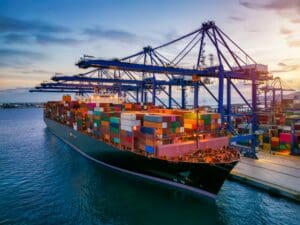For those interested in shipping jobs and the wider journey that sees products arriving here in the UK, it’s useful to understand the top shipping routes in the world.
Shipping routes are the lifelines of global trade, facilitating the movement of goods across continents. These routes are strategically important for international commerce, connecting major ports and economic hubs and provide great shipping jobs for mariners. Outlined below are some of the top shipping routes in the world.
The English Channel
Frequently referred to as the world’s busiest shipping lane, the English Channel links the North Sea to the Atlantic Ocean. It serves as a critical passage for vessels travelling between the ports of Northern Europe and the rest of the world. The narrow stretch of water between England and France sees a high volume of commercial and passenger traffic.
The Strait of Malacca
This is one of the most important shipping lanes in the world, connecting the Indian Ocean and the South China Sea to the Pacific Ocean. The strait is a key route for oil and goods travelling from the Middle East to Asia, especially China and Japan. Its strategic significance is underscored by the fact that it is one of the shortest sea routes between the Persian Gulf and Asian markets.
The Suez Canal
Connecting the Mediterranean Sea to the Red Sea, the Suez Canal is a vital shortcut for vessels travelling between Europe and Asia, eliminating the need to navigate around the southern tip of Africa. The canal significantly reduces travel time and distance, making it a crucial route for global trade.
The Panama Canal
This man-made waterway in Central America connects the Atlantic and Pacific Oceans, allowing vessels to avoid the lengthy and hazardous route around the southern tip of South America. The canal is essential for trade between the east and west coasts of America, as well as between Asia and the eastern United States.
The Strait of Hormuz
Situated between the Persian Gulf and the Gulf of Oman, the Strait of Hormuz is one of the world’s key passageways. It is the primary route for oil exports from the Gulf countries, making it a critical stretch of water for global energy supply.
The Bosporus Strait
This narrow, natural strait in Turkey connects the Black Sea with the Sea of Marmara, and ultimately the Mediterranean Sea. The Bosporus is a major route for Oil and Gas shipments from Russia and the Caspian region to Europe and beyond.
The South China Sea
This sea is a key maritime route for trade between Asia, Europe and the Middle East. It is one of the busiest waterways in the world, with a sizeable portion of the world’s shipping passing through it. The South China Sea is also rich in resources, making it a focal point for geopolitical tensions.
The North Atlantic Route
This transatlantic route links the ports of North America with those in Europe. It is a key passage for the exchange of goods between these two economically significant regions.
These shipping routes are not only vital for the transportation of goods but also play a crucial role in the global economy. They are influenced by geopolitical factors, technological advancements and environmental considerations, all of which can impact their efficiency and security.
